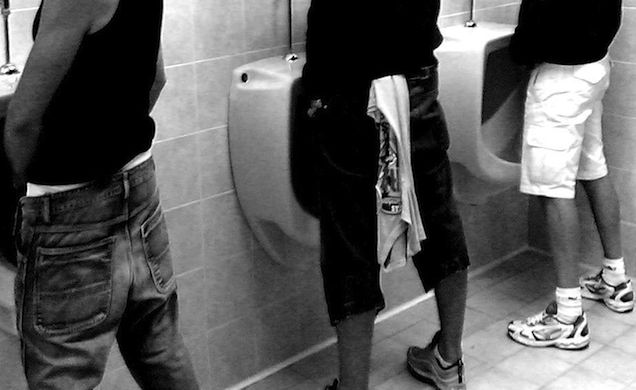Know Your Knob: all our penis health links
'For 35 years I couldn't pee in a urinal'

Looking back, it started when I was 11 and moved to the upper school. I was kicked and pushed into a urinal by some bullies. I started to avoid the toilets when other boys were there and use cubicles.
I didn't think too much of it until I was in my teens and started going out. I'd pee beforehand and then I'd be holding it in on the bus on the way home. You think you're the only one. After a while, you're turning down 4 out of 5 social invitations and only going to other people's homes. I even started to dream about passing out in the urinal as a result of a panic attack over not being able to pee.
My father wasn't a great socialiser so perhaps I never had a safe transition from home to public spaces such as pubs.
I was terrified even to do a search on the internet
I knew I needed to sort it out but I was terrified even to do a search on the internet because I thought someone could trace a search back to my computer.
It's a point of ego, I suppose. What sort of man are you if you can't even piss? Your self-esteem plummets.
Eventually I saw an article in the newspaper and visited the UK Paruresis Trust website. I monitored the bulletin board for a year without posting.
I also read Steven Soifer's book on shy bladder syndrome which was fantastic. It explained how tensing up is a perfectly natural reaction to a perceived threat. Any animal would do it. The inhibition can even cause your penis to shrivel which is an added embarrassment. It's a vicious circle.
Then I attended one of the UKPT workshops. I met an ordinary cross-section of society. The workshop offers facilitated self-help based on what's known as cognitive behaviour therapy. One part is graduated exposure therapy, which is a bit like the treatment used for phobias when they start off by showing you a photo of a spider and eventually you work up to holding one. The other part is cognitive therapy, which tackles the negative thought processes that make it difficult to pee (eg. people are watching me).
CBT puts you back in control
The first part of paruresis is the physical problem of not being able to urinate. The second part is how you feel about it and how it affects your life. Cognitive behaviour therapy (CBT) puts you back in control.
It's still a challenge for me to use urinals but I've realised that it's just a continuum. Most blokes would like a little privacy; I just like a little more. I used to avoid drinking anything so I wouldn't want to go. Now I do the opposite and drink plenty of liquid so I've got enough inside me to pee more easily. It's good - most of us don't drink enough water to be healthy, anyway.
Although it often starts in childhood, paruresis can come on at any age, even in your 30s or 40s. Some doctors are hopeless, of course - one bloke on the workshop was told by his GP to whistle! - but if you do develop problems when you're older, it makes sense to see your GP just to rule out things like an enlarged prostate. But if you can go when you're alone, it's probably paruresis.
Make no mistake, people have committed suicide over this condition. It can be very debilitating, especially if you're unable to use a cubicle.
| This article reflects the experience of the individual. It is not health information from the MHF under the terms of the NHS England Information Standard. It was last updated in 2006. Up-to-date information on this topic can be found here: Paruresis FAQs. |
Page created on February 21st, 2006
|
The Men’s Health Forum need your support It’s tough for men to ask for help but if you don’t ask when you need it, things generally only get worse. So we’re asking. In the UK, one man in five dies before the age of 65. If we had health policies and services that better reflected the needs of the whole population, it might not be like that. But it is. Policies and services and indeed men have been like this for a long time and they don’t change overnight just because we want them to. It’s true that the UK’s men don’t have it bad compared to some other groups. We’re not asking you to ‘feel sorry’ for men or put them first. We’re talking here about something more complicated, something that falls outside the traditional charity fund-raising model of ‘doing something for those less fortunate than ourselves’. That model raises money but it seldom changes much. We’re talking about changing the way we look at the world. There is nothing inevitable about premature male death. Services accessible to all, a population better informed. These would benefit everyone - rich and poor, young and old, male and female - and that’s what we’re campaigning for. We’re not asking you to look at images of pity, we’re just asking you to look around at the society you live in, at the men you know and at the families with sons, fathers and grandads missing. Here’s our fund-raising page - please chip in if you can. |




